Essay: Exploring the Value of Philosophy by Bertrand Russell
VerifiedAdded on 2023/01/23
|5
|1287
|98
Essay
AI Summary
This essay provides an analysis of Bertrand Russell's philosophical views, focusing on his book "The Problems of Philosophy." The essay explores Russell's concepts of sense-data, knowledge by acquaintance and description, and his critique of idealism. It delves into Russell's perspective on the value of philosophy, comparing it to natural sciences and addressing the uncertainty inherent in philosophical inquiry. The essay highlights Russell's argument that philosophy enhances critical thinking and challenges dogmatic beliefs, emphasizing its role in liberating thought and refining language. It concludes by discussing the importance of philosophy in understanding the world and its impact on human life, as well as its innate nature of uncertainty.
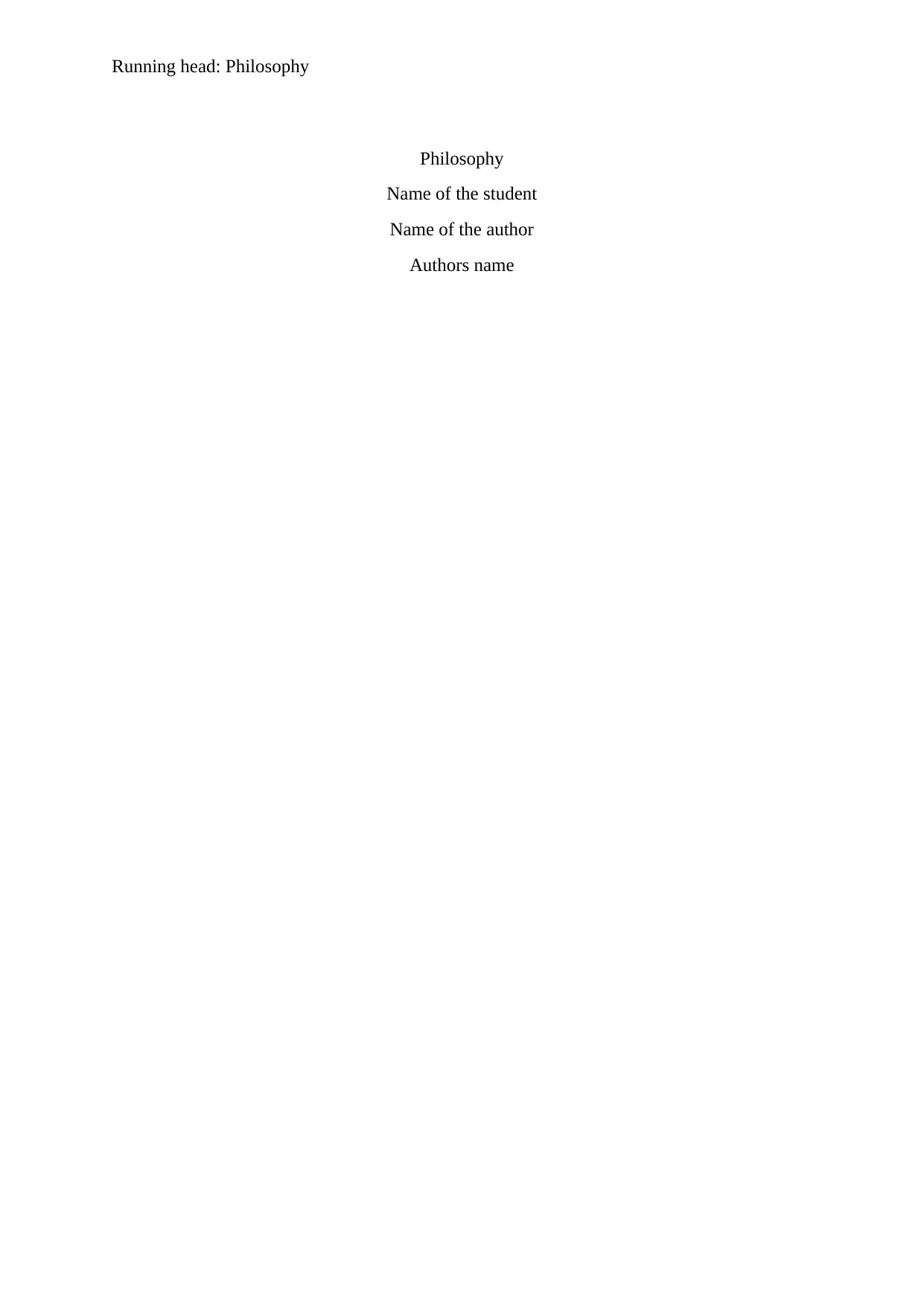
Running head: Philosophy
Philosophy
Name of the student
Name of the author
Authors name
Philosophy
Name of the student
Name of the author
Authors name
Paraphrase This Document
Need a fresh take? Get an instant paraphrase of this document with our AI Paraphraser
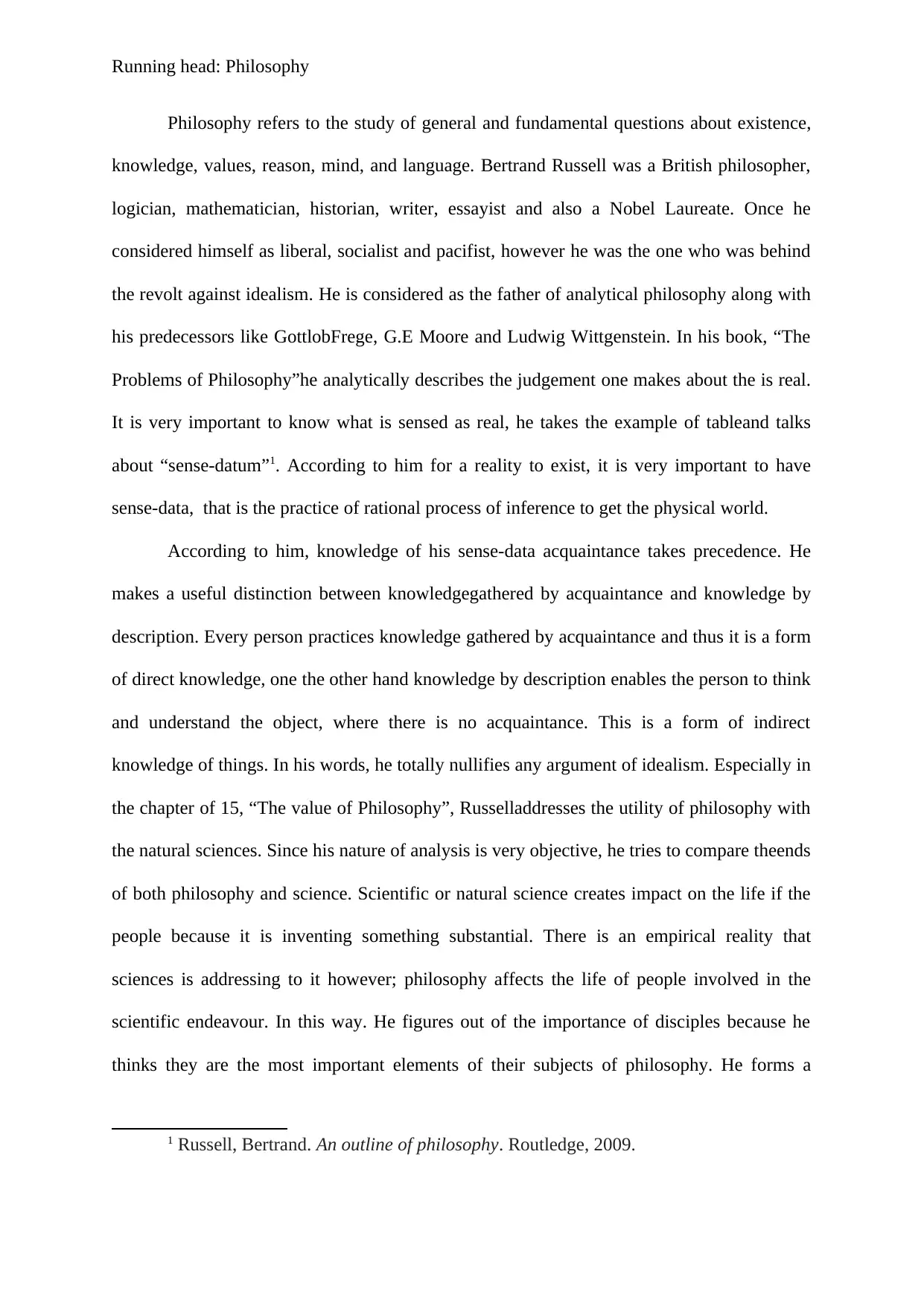
Running head: Philosophy
Philosophy refers to the study of general and fundamental questions about existence,
knowledge, values, reason, mind, and language. Bertrand Russell was a British philosopher,
logician, mathematician, historian, writer, essayist and also a Nobel Laureate. Once he
considered himself as liberal, socialist and pacifist, however he was the one who was behind
the revolt against idealism. He is considered as the father of analytical philosophy along with
his predecessors like GottlobFrege, G.E Moore and Ludwig Wittgenstein. In his book, “The
Problems of Philosophy”he analytically describes the judgement one makes about the is real.
It is very important to know what is sensed as real, he takes the example of tableand talks
about “sense-datum”1. According to him for a reality to exist, it is very important to have
sense-data, that is the practice of rational process of inference to get the physical world.
According to him, knowledge of his sense-data acquaintance takes precedence. He
makes a useful distinction between knowledgegathered by acquaintance and knowledge by
description. Every person practices knowledge gathered by acquaintance and thus it is a form
of direct knowledge, one the other hand knowledge by description enables the person to think
and understand the object, where there is no acquaintance. This is a form of indirect
knowledge of things. In his words, he totally nullifies any argument of idealism. Especially in
the chapter of 15, “The value of Philosophy”, Russelladdresses the utility of philosophy with
the natural sciences. Since his nature of analysis is very objective, he tries to compare theends
of both philosophy and science. Scientific or natural science creates impact on the life if the
people because it is inventing something substantial. There is an empirical reality that
sciences is addressing to it however; philosophy affects the life of people involved in the
scientific endeavour. In this way. He figures out of the importance of disciples because he
thinks they are the most important elements of their subjects of philosophy. He forms a
1 Russell, Bertrand. An outline of philosophy. Routledge, 2009.
Philosophy refers to the study of general and fundamental questions about existence,
knowledge, values, reason, mind, and language. Bertrand Russell was a British philosopher,
logician, mathematician, historian, writer, essayist and also a Nobel Laureate. Once he
considered himself as liberal, socialist and pacifist, however he was the one who was behind
the revolt against idealism. He is considered as the father of analytical philosophy along with
his predecessors like GottlobFrege, G.E Moore and Ludwig Wittgenstein. In his book, “The
Problems of Philosophy”he analytically describes the judgement one makes about the is real.
It is very important to know what is sensed as real, he takes the example of tableand talks
about “sense-datum”1. According to him for a reality to exist, it is very important to have
sense-data, that is the practice of rational process of inference to get the physical world.
According to him, knowledge of his sense-data acquaintance takes precedence. He
makes a useful distinction between knowledgegathered by acquaintance and knowledge by
description. Every person practices knowledge gathered by acquaintance and thus it is a form
of direct knowledge, one the other hand knowledge by description enables the person to think
and understand the object, where there is no acquaintance. This is a form of indirect
knowledge of things. In his words, he totally nullifies any argument of idealism. Especially in
the chapter of 15, “The value of Philosophy”, Russelladdresses the utility of philosophy with
the natural sciences. Since his nature of analysis is very objective, he tries to compare theends
of both philosophy and science. Scientific or natural science creates impact on the life if the
people because it is inventing something substantial. There is an empirical reality that
sciences is addressing to it however; philosophy affects the life of people involved in the
scientific endeavour. In this way. He figures out of the importance of disciples because he
thinks they are the most important elements of their subjects of philosophy. He forms a
1 Russell, Bertrand. An outline of philosophy. Routledge, 2009.
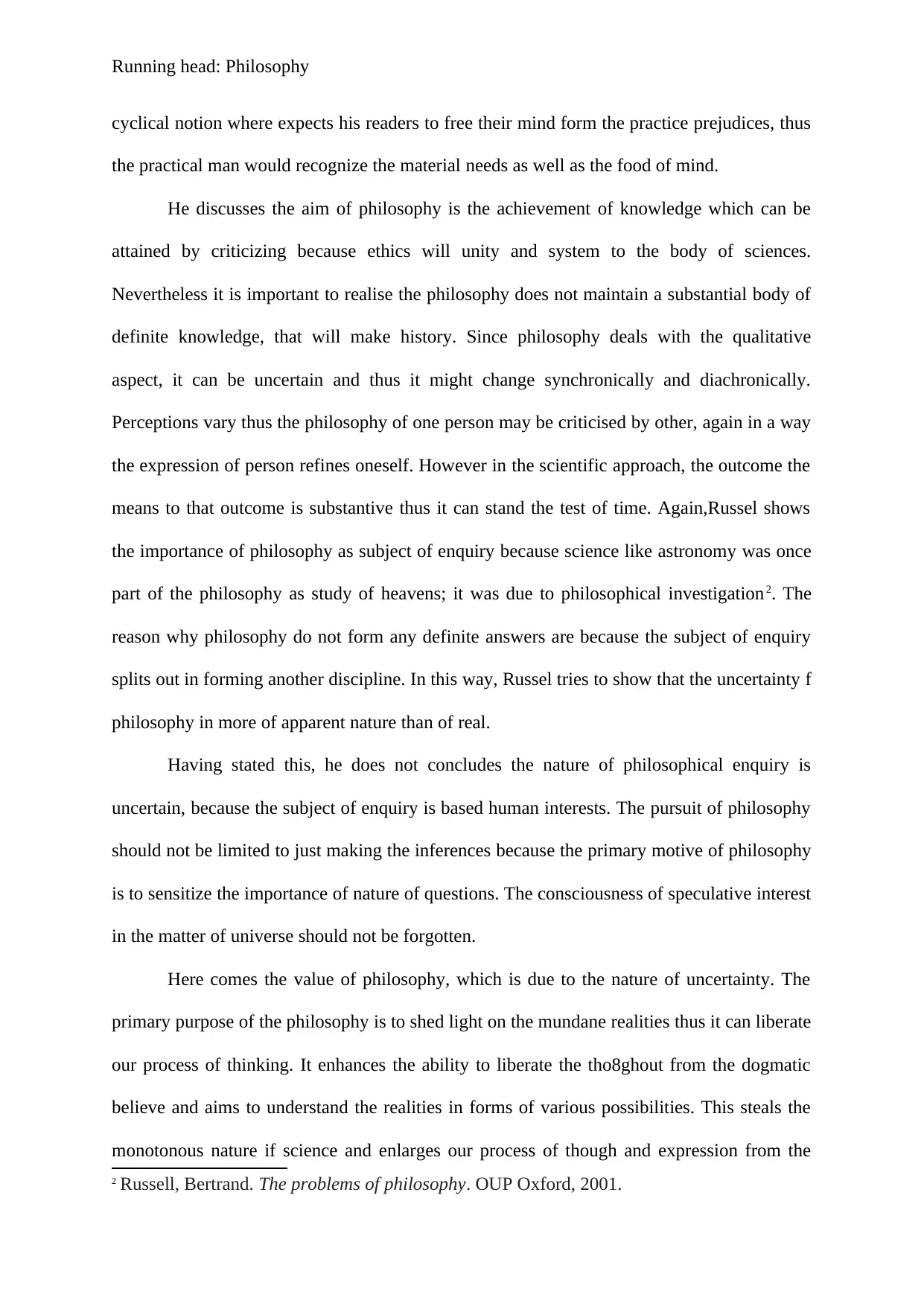
Running head: Philosophy
cyclical notion where expects his readers to free their mind form the practice prejudices, thus
the practical man would recognize the material needs as well as the food of mind.
He discusses the aim of philosophy is the achievement of knowledge which can be
attained by criticizing because ethics will unity and system to the body of sciences.
Nevertheless it is important to realise the philosophy does not maintain a substantial body of
definite knowledge, that will make history. Since philosophy deals with the qualitative
aspect, it can be uncertain and thus it might change synchronically and diachronically.
Perceptions vary thus the philosophy of one person may be criticised by other, again in a way
the expression of person refines oneself. However in the scientific approach, the outcome the
means to that outcome is substantive thus it can stand the test of time. Again,Russel shows
the importance of philosophy as subject of enquiry because science like astronomy was once
part of the philosophy as study of heavens; it was due to philosophical investigation2. The
reason why philosophy do not form any definite answers are because the subject of enquiry
splits out in forming another discipline. In this way, Russel tries to show that the uncertainty f
philosophy in more of apparent nature than of real.
Having stated this, he does not concludes the nature of philosophical enquiry is
uncertain, because the subject of enquiry is based human interests. The pursuit of philosophy
should not be limited to just making the inferences because the primary motive of philosophy
is to sensitize the importance of nature of questions. The consciousness of speculative interest
in the matter of universe should not be forgotten.
Here comes the value of philosophy, which is due to the nature of uncertainty. The
primary purpose of the philosophy is to shed light on the mundane realities thus it can liberate
our process of thinking. It enhances the ability to liberate the tho8ghout from the dogmatic
believe and aims to understand the realities in forms of various possibilities. This steals the
monotonous nature if science and enlarges our process of though and expression from the
2 Russell, Bertrand. The problems of philosophy. OUP Oxford, 2001.
cyclical notion where expects his readers to free their mind form the practice prejudices, thus
the practical man would recognize the material needs as well as the food of mind.
He discusses the aim of philosophy is the achievement of knowledge which can be
attained by criticizing because ethics will unity and system to the body of sciences.
Nevertheless it is important to realise the philosophy does not maintain a substantial body of
definite knowledge, that will make history. Since philosophy deals with the qualitative
aspect, it can be uncertain and thus it might change synchronically and diachronically.
Perceptions vary thus the philosophy of one person may be criticised by other, again in a way
the expression of person refines oneself. However in the scientific approach, the outcome the
means to that outcome is substantive thus it can stand the test of time. Again,Russel shows
the importance of philosophy as subject of enquiry because science like astronomy was once
part of the philosophy as study of heavens; it was due to philosophical investigation2. The
reason why philosophy do not form any definite answers are because the subject of enquiry
splits out in forming another discipline. In this way, Russel tries to show that the uncertainty f
philosophy in more of apparent nature than of real.
Having stated this, he does not concludes the nature of philosophical enquiry is
uncertain, because the subject of enquiry is based human interests. The pursuit of philosophy
should not be limited to just making the inferences because the primary motive of philosophy
is to sensitize the importance of nature of questions. The consciousness of speculative interest
in the matter of universe should not be forgotten.
Here comes the value of philosophy, which is due to the nature of uncertainty. The
primary purpose of the philosophy is to shed light on the mundane realities thus it can liberate
our process of thinking. It enhances the ability to liberate the tho8ghout from the dogmatic
believe and aims to understand the realities in forms of various possibilities. This steals the
monotonous nature if science and enlarges our process of though and expression from the
2 Russell, Bertrand. The problems of philosophy. OUP Oxford, 2001.
⊘ This is a preview!⊘
Do you want full access?
Subscribe today to unlock all pages.

Trusted by 1+ million students worldwide
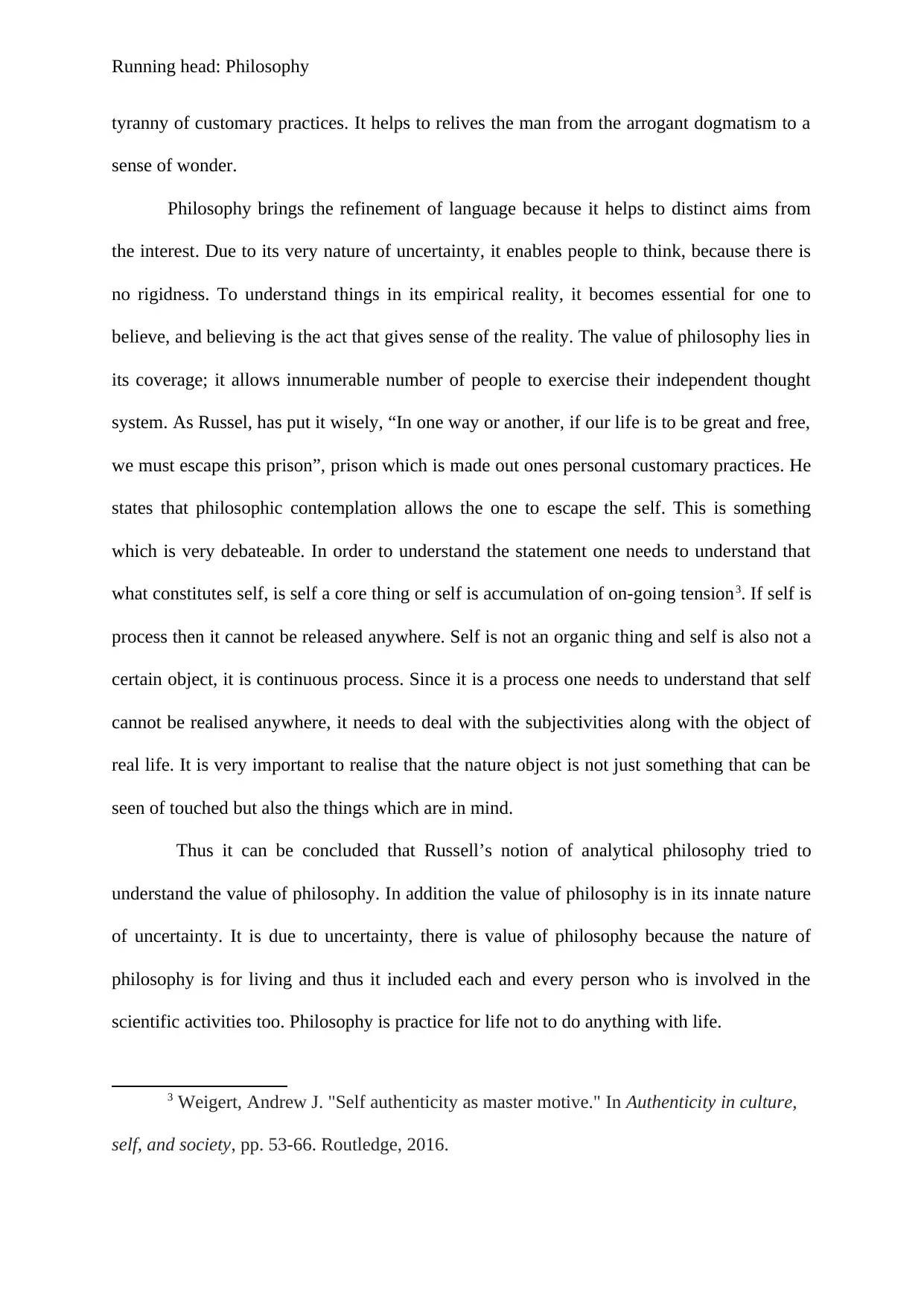
Running head: Philosophy
tyranny of customary practices. It helps to relives the man from the arrogant dogmatism to a
sense of wonder.
Philosophy brings the refinement of language because it helps to distinct aims from
the interest. Due to its very nature of uncertainty, it enables people to think, because there is
no rigidness. To understand things in its empirical reality, it becomes essential for one to
believe, and believing is the act that gives sense of the reality. The value of philosophy lies in
its coverage; it allows innumerable number of people to exercise their independent thought
system. As Russel, has put it wisely, “In one way or another, if our life is to be great and free,
we must escape this prison”, prison which is made out ones personal customary practices. He
states that philosophic contemplation allows the one to escape the self. This is something
which is very debateable. In order to understand the statement one needs to understand that
what constitutes self, is self a core thing or self is accumulation of on-going tension3. If self is
process then it cannot be released anywhere. Self is not an organic thing and self is also not a
certain object, it is continuous process. Since it is a process one needs to understand that self
cannot be realised anywhere, it needs to deal with the subjectivities along with the object of
real life. It is very important to realise that the nature object is not just something that can be
seen of touched but also the things which are in mind.
Thus it can be concluded that Russell’s notion of analytical philosophy tried to
understand the value of philosophy. In addition the value of philosophy is in its innate nature
of uncertainty. It is due to uncertainty, there is value of philosophy because the nature of
philosophy is for living and thus it included each and every person who is involved in the
scientific activities too. Philosophy is practice for life not to do anything with life.
3 Weigert, Andrew J. "Self authenticity as master motive." In Authenticity in culture,
self, and society, pp. 53-66. Routledge, 2016.
tyranny of customary practices. It helps to relives the man from the arrogant dogmatism to a
sense of wonder.
Philosophy brings the refinement of language because it helps to distinct aims from
the interest. Due to its very nature of uncertainty, it enables people to think, because there is
no rigidness. To understand things in its empirical reality, it becomes essential for one to
believe, and believing is the act that gives sense of the reality. The value of philosophy lies in
its coverage; it allows innumerable number of people to exercise their independent thought
system. As Russel, has put it wisely, “In one way or another, if our life is to be great and free,
we must escape this prison”, prison which is made out ones personal customary practices. He
states that philosophic contemplation allows the one to escape the self. This is something
which is very debateable. In order to understand the statement one needs to understand that
what constitutes self, is self a core thing or self is accumulation of on-going tension3. If self is
process then it cannot be released anywhere. Self is not an organic thing and self is also not a
certain object, it is continuous process. Since it is a process one needs to understand that self
cannot be realised anywhere, it needs to deal with the subjectivities along with the object of
real life. It is very important to realise that the nature object is not just something that can be
seen of touched but also the things which are in mind.
Thus it can be concluded that Russell’s notion of analytical philosophy tried to
understand the value of philosophy. In addition the value of philosophy is in its innate nature
of uncertainty. It is due to uncertainty, there is value of philosophy because the nature of
philosophy is for living and thus it included each and every person who is involved in the
scientific activities too. Philosophy is practice for life not to do anything with life.
3 Weigert, Andrew J. "Self authenticity as master motive." In Authenticity in culture,
self, and society, pp. 53-66. Routledge, 2016.
Paraphrase This Document
Need a fresh take? Get an instant paraphrase of this document with our AI Paraphraser
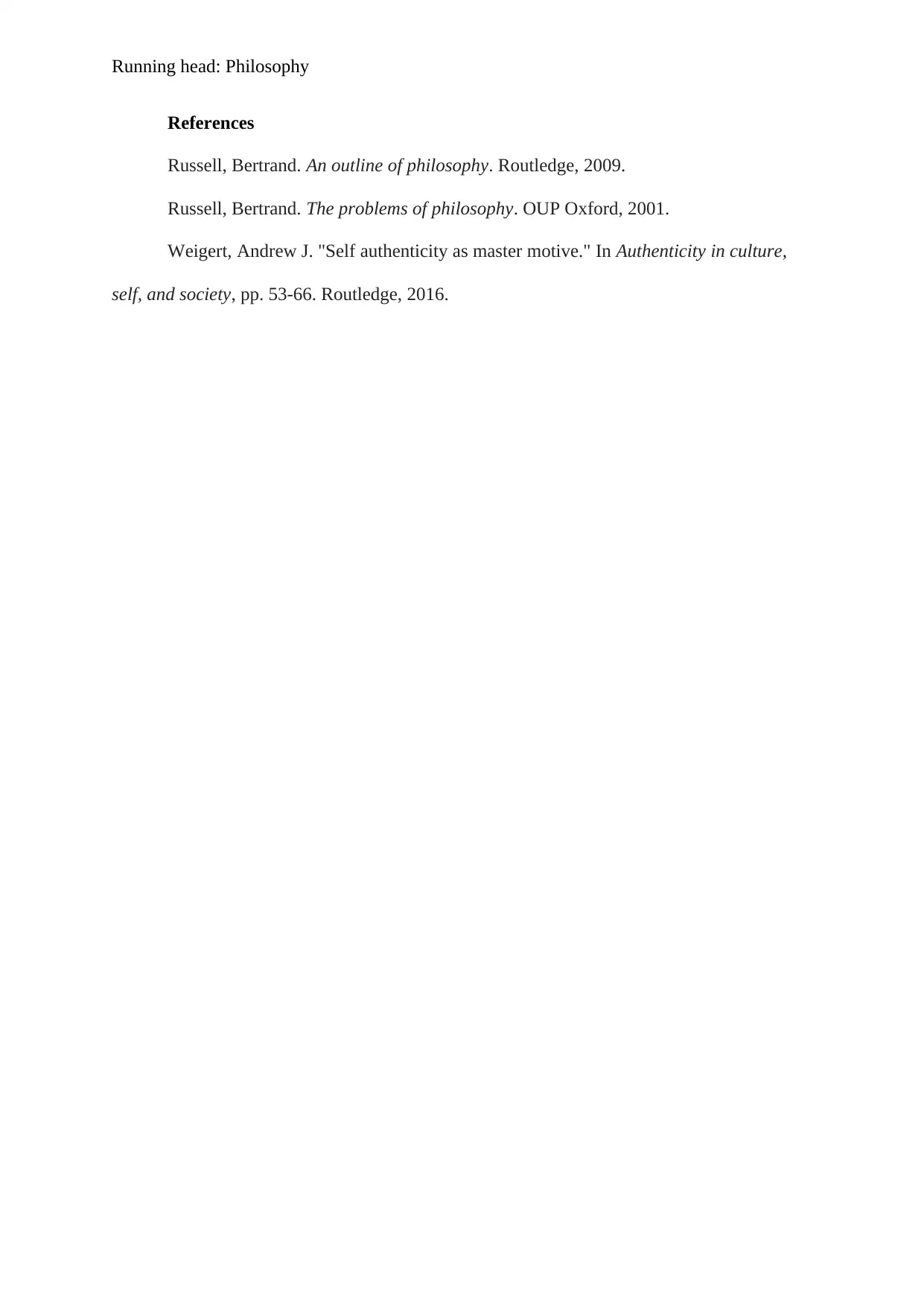
Running head: Philosophy
References
Russell, Bertrand. An outline of philosophy. Routledge, 2009.
Russell, Bertrand. The problems of philosophy. OUP Oxford, 2001.
Weigert, Andrew J. "Self authenticity as master motive." In Authenticity in culture,
self, and society, pp. 53-66. Routledge, 2016.
References
Russell, Bertrand. An outline of philosophy. Routledge, 2009.
Russell, Bertrand. The problems of philosophy. OUP Oxford, 2001.
Weigert, Andrew J. "Self authenticity as master motive." In Authenticity in culture,
self, and society, pp. 53-66. Routledge, 2016.
1 out of 5
Related Documents
Your All-in-One AI-Powered Toolkit for Academic Success.
+13062052269
info@desklib.com
Available 24*7 on WhatsApp / Email
![[object Object]](/_next/static/media/star-bottom.7253800d.svg)
Unlock your academic potential
Copyright © 2020–2026 A2Z Services. All Rights Reserved. Developed and managed by ZUCOL.





